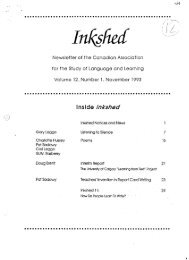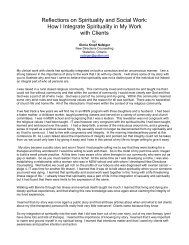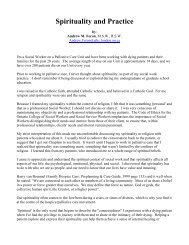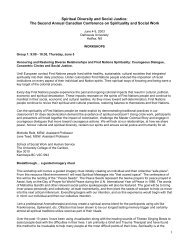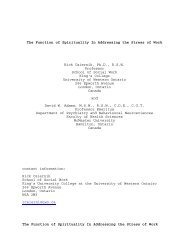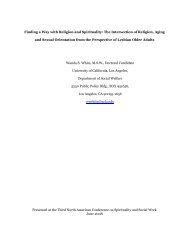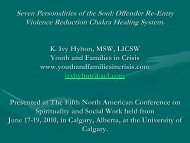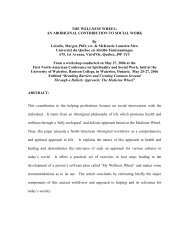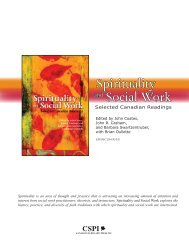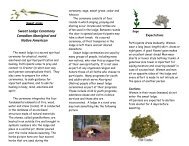The Bonderman Travel Fellowship Essay - St. Thomas University
The Bonderman Travel Fellowship Essay - St. Thomas University
The Bonderman Travel Fellowship Essay - St. Thomas University
You also want an ePaper? Increase the reach of your titles
YUMPU automatically turns print PDFs into web optimized ePapers that Google loves.
As a former refugee and first-generation college student, I have encountered and conquered the following<br />
problems in my efforts to become educated: (1) coping with financial and physical survival; (2) adjusting to<br />
a new and dramatically different culture; and (3) learning English well enough to excel in academic courses.<br />
<strong>The</strong> tremendous support of many faculty and friends also encouraged me to overcome the stresses<br />
experienced by a refugee separated from her family, and provided a much needed and reliable support<br />
system. Above all, my experience with trauma has taught me to cope with the fears of ego and be who I<br />
truly am. <strong>The</strong>se life experiences have illuminated for me the meaning and nature of courage, patience,<br />
compassion, and faith. In addition, such experiences enhance my empathy with many Việt Kiều who are<br />
acutely aware of the conflicting loyalties to their original culture and the demands of adapting to their new<br />
host cultures. A significant number of Việt Kiều feel the need to maintain pre-revolutionary Vietnamese<br />
heritage and traditions, but many have negotiated a place within a more mainstreamed culture, while still<br />
others engage in the formation of distinct hybrid identities centering around dominant Western popular<br />
cultural forms and traditional cultural values. In short, diasporic Vietnamese identity has become multilayered<br />
and is in flux.<br />
For myself, my personal fear of the ocean has gradually subsided; yet fear of traveling alone outside<br />
America has endured. My sheltered childhood together with the trauma experienced by a boat person, who<br />
witnessed interpersonal violence during my flight and refugee camp period, as well as in poor American<br />
neighborhoods, has combined to make any travel to better understand the world seem only a fantastic<br />
dream. Every now and then I envy the lives of adventurous Western women as portrayed on television -<br />
persons unbound by a sense of geographical limits. I yearn for the opportunity to broaden my intellectual<br />
and personal horizons through travel to places where people have solved life’s puzzles through different<br />
cultures and societies. Yet the focus of my passion for knowledge and community activism distracts me<br />
from that dream and longing. I love to engage in work, practical or theoretical, that addresses issues of<br />
culture, art, war, trauma, survival, spirituality and development.<br />
After living twenty years in California, I recently decided to continue my journey to wisdom through the Ph.D.<br />
Program at UW. Recognizing self-transformation as a largely neglected but critical factor in wellness, I aim<br />
to develop spiritually-based models of prevention/ intervention that can be of demonstrated effectiveness in<br />
reducing the suffering of refugee and other displaced populations. I have joined others through mutual<br />
caring, connectedness, and growth at the community and societal level to fight against oppression and<br />
discrimination in a movement based on non-violence and compassion. This is a positive way to empower<br />
myself and disenfranchised populations. However, the opportunity to travel in order to broaden my<br />
worldview never seemed possible until I became aware of the <strong>Bonderman</strong> <strong>Fellowship</strong>.<br />
Unlike the first wave of Vietnamese refugees, whose family ties, resources and elite backgrounds assisted<br />
in merging into the new environment, later comers had to negotiate a difficult path of personal and cultural<br />
transitions. Like others, my feelings of elation and relief with arrival to asylum were overwhelmed by the<br />
tremendous losses—family bonds, soul mates, friendships, homeland, and shared identity. I made a dear<br />
friend in camp, who shared in these transitions. My friend and I particularly embraced our common<br />
experiences—being of the same age, having been rescued by the same ship, having volunteered as<br />
interpreters in the same refugee health clinic, and having taken the same language/cultural classes. At the<br />
end, we were two people traveling empty-handed getting on the same airplane to the US. But regrettably<br />
we parted from each other at SEATAC to start a new life. In due course we turned out to live very different<br />
lives after twenty years. My friend’s love of traveling became his obsession. Moreover, he was apt to live in<br />
the past, disclosing that the refugee camp time was his happiest. He, more than anybody else I’ve known,<br />
revisited these abandoned primitive camp locations several times, in addition to his exploration of other<br />
regions in the world. Our conversations were filled with his updated news of our former boat companions. I<br />
admired my friend’s powerful memories of that past, and his commitment not to forget. And so I was terribly<br />
2




